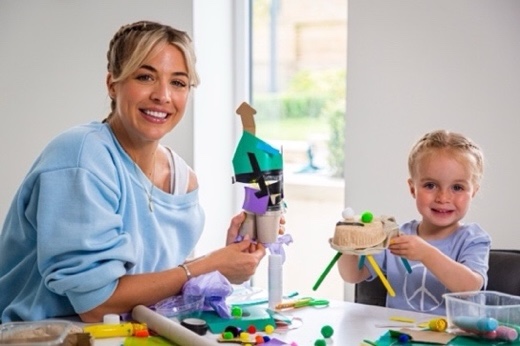GEMMA ATKINSON AND THREE-YEAR-OLD DAUGHTER MIA HELP TO LAUNCH NEW RESOURCES FROM FAMILY ACTION AND FISHER-PRICE®

GEMMA ATKINSON AND THREE-YEAR-OLD DAUGHTER MIA HELP TO LAUNCH NEW RESOURCES FROM FAMILY ACTION AND FISHER-PRICE® HIGHLIGHTING FUN WAYS FAMILIES CAN PLAY TOGETHER THIS SUMMER
Actress, radio presenter and celebrity mum Gemma Atkinson, has teamed up with three-year-old daughter, Mia, to help launch new resources as part of ‘Creating Happy Memories,’ the family-focused campaign from Family Action supported by Fisher-Price®. The campaign is aimed at inspiring parents and caregivers with easy-to-do, accessible ways to play with their children over the summer, with resources that will help to create fun and memorable moments whilst also helping with their child’s development and boosting their own confidence to play.
New resources as part of ‘Creating Happy Memories‘ launch today with dedicated pages on the Family Action website now live at www.family-action.org.uk/creating-happy-memories where mums, dads and caregivers will find expert guidance and practical ideas to help them enjoy more play with the children in their lives. The Creating Happy Memories campaign also includes practical tips from Fisher-Price™ Play Lab child development experts on how to create engaging play spaces, fun, simple, low-cost activities that the whole family can enjoy and small actions that can be taken to help get the most from playing together.
The play activities being hosted on the Family Action website for parents to easily access are junk modelling, mud and sand, nature play, and food play. There are also blog posts discussing any barriers to play that parents may feel, to help them overcome these and show how easy it can be to play and the benefits of play for parents too. This includes how to make time for play, how to set up an environment for play, being comfortable with risk and how to ‘let go’ and play as an adult.
The resources for the ‘Creating Happy Memories’ campaign are a continuation of the year-long partnership between Fisher-Price® and Family Action which was launched earlier this year to help support families with early childhood development. The partnership brings together the 60 years of expertise from the Fisher-Price™ Play Lab and the on-the-ground practical expertise from Family Action staff who use play on a daily basis to help children with their early years development.
In a heart-warming video recorded last week at their family home, Gemma and daughter Mia are shown trying out junk modelling, one of the recommended activities from the campaign, with them both rolling up their sleeves and getting stuck in to build a rocket ship and elephant, both made out of unwanted items that would have otherwise gone into the recycling bin.
Gemma Atkinson said: “I still remember the games that my parents played with me, and I want Mia to have those memories of us playing together too. That’s why I am so proud to partnering with Fisher-Price Play Lab on their collaboration with Family Action for the Creating Happy Memories campaign. It’s massively important to play with our children and this campaign gives lots of lovely inspiration and tips for doing this over the summer with low-cost activities that are really fun and packed full of learning opportunities for the little ones.”
Lisa Lohiser, Early Childhood Development expert at the Fisher-Price™ Play Lab, added: “Research has shown that play equals learning in the early years, and learning is boosted when children play with others, especially a caregiver. Through purposeful play you can help your child learn new things and reach their highest potential while bonding with them – there is no right or wrong way to play – being present engaging with your child you can’t go wrong, no matter what kind of play they are engaging in they are growing. A child’s environment and what is available to play with does affect the ability to play, so having access to things like a variety of toys, their peers, and caregivers changes how they engage and experience it. Engaging in different types of play, such as exploratory, roleplay or block play is also important to whole child development.”
Emily Parker, Brand and Campaigns Manager at Family Action, said: “We are delighted to be able to offer families additional resources to support play this summer. Family Action believes everyone should be able to enjoy play – not only to support child development, but to build stronger families through the bonding and wellbeing benefits it brings.”
As part of today’s launch, an insight from Dr Jacqueline Harding, an expert in child development and neurophysiology, showed that fewer than 10 minutes of one-on-one play with children can help crucial developmental benefits . And it won’t just benefit the child either – but will reduce levels of stress and anxiety in their parents at the same time. As a result, parents who feel they have to spend money to keep their children engaged are being told to ‘relax’, as placing too much stress on play can make the experience negative from the start.
Dr Harding, an early childhood expert at Middlesex University London, believes simple eye contact and attention is what children crave, from their earliest days with games of peek-a-boo to more advanced play. There’s no set time limit on how much play time a child needs per day – instead, it depends on the quality of the interactions and the engagement and willingness of the parent to participate.
Dr Jacqueline Harding said: “The good news is that what your young child or older children want is social interaction, and that’s free. So, first of all, don’t fear a child saying they’re bored, because children will be their best selves during play. And we don’t have to provide for them every moment, we don’t have to take them to a theme park or zoo every day and all the rest of it – think back, through the perspective of the child, through their eyes.
“What did you really, really want? You wanted your mum, dad, carer or grandparent to watch you. A good way of battling boredom is to set a child a challenge – you can have a challenge per day – to make a robot out of boxes, have a treasure hunt, maybe something sensory based like a bit of gardening, or go to the park or whatever you want.”
Dr Harding also believes creativity has a positive impact on the nervous system, with children experiencing a leap into the unknown with an ‘aha moment’. And once they have realised something new, such as being able to create something out of junk as an example, showing the parent what they have created gives them a real buzz, which doesn’t cost a thing, while aiding cognitive development.
The role of detective is also advised for mums and dads as children will tend to show you what they want according to the expert, whether that be rough and tumble play, the need to run or desire for messy play.
Dr Harding added: “When you’re with children, you watch their body language, you see how they’re feeling, watch their shoulders, their body language – they tell you what they need. They’re telling you, ‘I need to get up and have a move, and I need to run, and I need to do a headstand’, I need to do these things.’
“There’s a whole variety of play which can help, it’s called malleable play, play with painting, jumping in mud and all that sort of thing. But afterwards, don’t expect to have a perfect house.”




